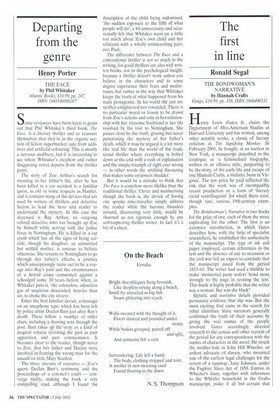Departing from the genre
Henry Porter
THE FACE by Phil Whitaker
Atlantic Books, £10.99, pp. 247, ISBN 1843540000207
Some reviewers have been keen to point out that Phil Whitaker's third book, The Face, is a literary thriller and so reassure themselves that they're in the organic section of fiction supermarket, safe from additives and artificial colouring. This is mostly a nervous snobbery, but it is interesting to see where Whitaker's excellent and rather disquieting novel departs from the thriller genre.
The story of Zoe Arthur's search for meaning in her father's life, after he has been killed in a car accident is a familiar quest, as old in some respects as Hamlet, and it contains many of the devices that are used by writers of thrillers and detective fiction to lead the hero and reader to understand the mystery. In this case the deceased is Ray Arthur, an outgoing retired detective who has brought up Zoe by himself while serving with the police force in Nottingham. He is killed in a car crash which has all the signs of being suicide, though his daughter, an unmarried but settled mother, is anxious to believe otherwise. She returns to Nottingham to go through her father's effects, a journey which unsurprisingly turns out to be a voyage into Ray's past and the circumstances of a horrid crime committed against a schoolgirl some 30 years before when, as Whitaker puts it, the colourless, odourless gas of suspicion descended, heavier than air, to choke the city streets'.
Enter the first familiar device, a message on an ansaphone tape, which has been left by police artist Declan Barr just after Ray's death. There follow a number of other clues, including a drawing sent through the post. Barr takes up the story as a kind of magical witness revisiting the past as part apparition and part commentator. It becomes clear to the reader, though never to Zoe, that her father and Declan were involved in framing the wrong man for the assault on little Mary Scanlon.
The three streams of narrative — Zoe's quest, Declan Barr's testimony and the proceedings of a coroner's court — converge nicely, making the book a very compelling read, although I found the description of the child being sodomised, 'the sudden exposure to the filth of what people will do', a bit unnecessary and occasionally felt that Whitaker went on a little too much about Zoe's own child and her relations with a wholly uninteresting partner. Paul.
The difference between The Face and a conventional thriller is not so much in the writing, for good thrillers are also well written books, nor in the psychological insight, because a thriller doesn't work unless you believe in the characters and to some degree experience their fears and misfortunes, but rather in the way that Whitaker keeps the truth of what happened from his main protagonist. In his world the just are neither enlightened nor rewarded. There is no particular moral or lesson to be drawn from Zoe's actions and only in her relationship with her tiresome boyfriend is her life resolved by the visit to Nottingham. She passes close by the truth, grazing but never penetrating the mystery of her father's death, which it may be argued is a lot more like real life than the world of the traditional thriller where everything is bolted down at the end with a rush of explanation and the simple triumph of right over wrong — in other words the artificial flavouring that makes some reviewers shudder.
But it would be a mistake to think that The Face is somehow more lifelike than the traditional thriller. Clever and mesmerising though the book is, the device of having one spooky time-traveller simply address the reader while the heroine blunders around, discovering very little, would be shunned as not rigorous enough by any self-respecting thriller writer. In fact it's a hit of a cheat.


































































 Previous page
Previous page